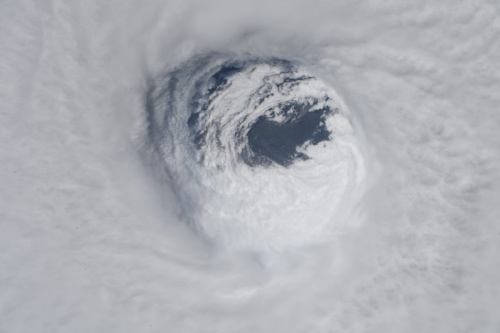Economic losses caused by climate-related disasters have soared by about two and a half times in the last 20 years, the United Nations said on Wednesday.
From 1998 to 2017, direct losses from all disasters totalled $US2.9 trillion, of which 77 per cent was due to extreme weather that is intensifying as the world warms, the UN Office for Disaster Risk Reduction said in a report.

A view of the eye of Hurricane Michael taken on 10th October from the International Space Station currently orbiting Earth. The category 4 hurricane made landfall in Florida this week. Natural disasters cost the US $US945 billion between 1998 and 2017, according to the UNISDR report. PICTURE: Dr Serena M Auñón-Chancellor/NASA
That compares with overall losses of $US1.3 trillion from 1978 to 1997, 68 per cent of that accounted for by climate and weather hazards, including storms, floods and droughts.
“We can see that climate change is playing an increasingly important role in driving up disaster losses around the world, and that probably will be the case in the future as well,” said Ricardo Mena, an official at the Geneva-based UNISDR.
On Monday, climate scientists warned that if global average temperatures rise more than 1.5 degrees Celsius above pre-industrial times, it would lead to more suffering – especially among the world’s poorest.
The planet has already heated up by about one degree Celsius.
Climate change is increasing the frequency and severity of extreme weather, and disasters will continue to set back sustainable development, the UNISDR report warned.
Climate-related disasters accounted for about 90 per cent of the 7,255 major disasters between 1998 and 2017, most of them floods and storms, it said.
Losses were greatest in the United States at $US945 billion, followed by China at $US492 billion and Japan at $US376 billion.
In the past two decades, 1.3 million people were killed and 4.4 billion were injured, left homeless, displaced or required emergency help.
More than half the deaths were caused by 563 earthquakes and related tsunamis, said the report drawing on data from the Centre for Research on the Epidemiology of Disasters in Belgium.
Although rich countries shoulder the highest absolute economic losses, the report noted the disproportionate impact of disasters on low and middle-income countries.
People in poorer nations are seven times more likely to be killed by a disaster than in wealthier ones, Mena told the Thomson Reuters Foundation.
In developing countries, economic losses are not analysed for many disasters, meaning the new data was just the “tip of the iceberg”, he noted.
Puerto Rico was the only high-income territory ranked among the top ten places for annual losses as a percentage of economic growth, alongside Haiti, Honduras, Cuba, El Salvador, Nicaragua, Georgia, Mongolia, Tajikistan and North Korea.
Mami Mizutori, UN special representative for disaster risk reduction, called for greater efforts to tackle high fatalities in regions prone to earthquakes.
The 2,000 deaths and widespread destruction caused by last month’s earthquake and tsunami on Indonesia’s Sulawesi island exposed the need to raise public awareness and apply high standards for construction in seismic zones, she added.
The report ramped up the urgency for countries to put into practice a global plan for managing disaster risk hammered out in 2015 in Sendai, Japan, UNISDR’s Mena said.





